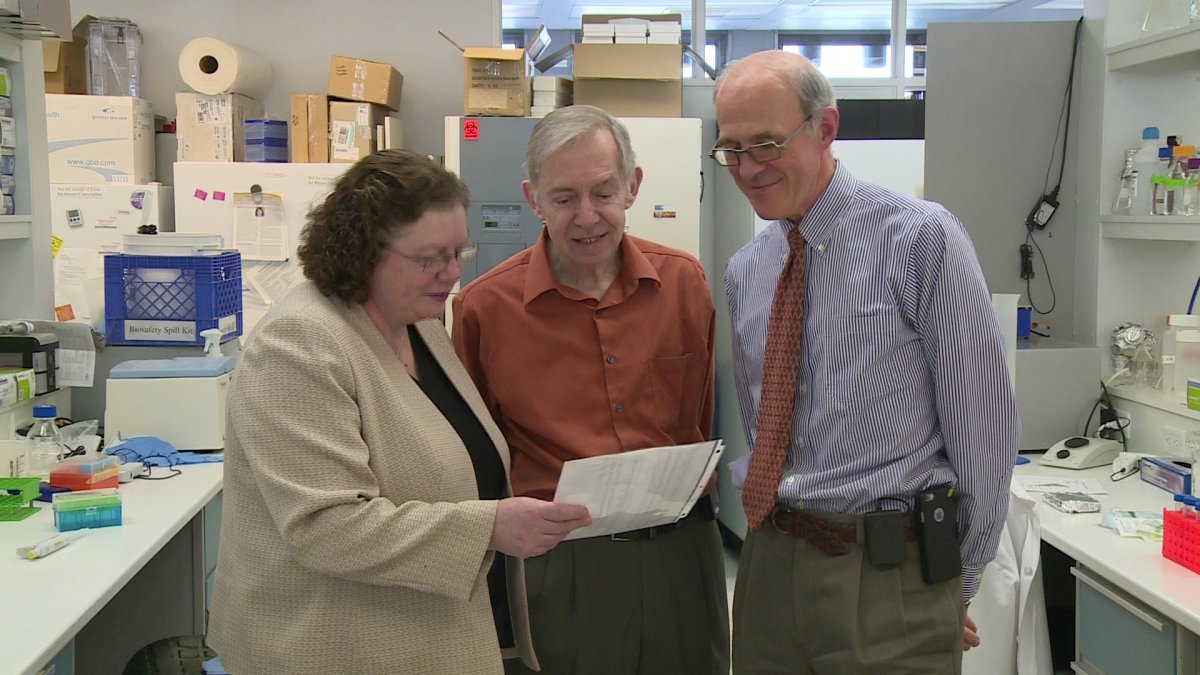HALIFAX – A group of Halifax researchers are leading an international study in hopes of creating better treatments for rheumatoid arthritis patients.

Dr. Jean Marshall, the principal investigator and head of the Department of Microbiology and Immunology at Dalhousie University, said researchers are looking at inflammation and rheumatoid arthritis. Researchers are also looking at inflammation in relation to heart disease.
Rheumatoid arthritis is a type of inflammatory arthritis that is also autoimmune. The tissue in the lining of a patient’s joints are essentially attacked by his or her own immune system.
The outcome can be swelling, pain and inflammation. If left untreated, it can lead to joint damage that is irreversible.
The researchers are currently recruiting 50 rheumatoid arthritis patients to be a part of the study. The participants must be newly diagnosed so researchers can track the progress of their early treatments.
Blood and tissue samples will be taken and researchers will look at why some participants are able to control their inflammation while others cannot.
“In some cases, people get better and in some cases people don’t respond as well and go on to more chronic serious diseases. We’re looking at what makes people recover successfully, both the cells and processes and immune system changes that are associated with successful recovery,” Marshall said.
Dr. John Hanly, a rheumatologist with Capital Health and a professor in the Division of Rheumatology at Dalhousie University, said remission occurs in about 20 per cent of rheumatoid arthritis patients.
“But not for everybody so that’s why these sorts of studies are important,” he said.
Hanly said uncontrolled inflammation can cause stiffness and swelling for rheumatoid arthritis patients, which can lead to difficulty walking, fatigue and irreversible damage to the joints.
“It’s important for this inflammation to be controlled early in the disease before any damage occurs so that the joints are preserved.”
Researchers said the study is unique because it looks at what the body is doing right to repair itself as opposed to what may be going wrong.
“We’re hoping to be able to identify the cells that are responsible for healing some patients and whether there is a deficiency of those cells in the patients whose arthritis does not respond to standard therapy,” said Dr. Thomas Issekutz, a co-investigator and the head of the Division of Immunology at Dalhousie University.
“It has the potential to give us a much better understanding of which patients might follow which route in their progression of the disease or resolution of the disease.”
The goal is to create better treatments and therapies for patients.
“If we can better understand those processes then maybe we can enhance them or exploit them to develop new drugs, which will help people to recover more successfully,” Marshall said.
“The importance of the study is to learn more about an illness that can cause irrevocable damage to the affected joints and lead to disease in people in the prime of their lives, which is not the way it should be,” Hanly said.
Living with rheumatoid arthritis has been the reality for Tiffany Webber the last 10 years.
Webber, 34, was diagnosed with the condition when she was 24 years old. The Cole Harbour woman said the disease has taken a toll on her.
“It first started as pain in my hands. It was hard to grip things, turn doorknobs, take care of my children,” she said.
She has been able to control her arthritis through medication and is now in remission. But she knows that it may still one day disable her.
Webber said more research into the disease and how it can be controlled is invaluable for sufferers like her.
“I’d be able to … go out and enjoy sports and walk on flat ground or walk on the beach for maybe more than five minutes without getting pain,” she said.
“It would mean you would have a better quality of life sooner.”
Susan Tilley-Russell, executive director of the Maritime chapter of The Arthritis Society said there are 30,000 Nova Scotians living with rheumatoid arthritis.
“This research is incredibly important because it’s something people live with constantly. It affects their life, both at work, at home, at their leisure time,” she said.
“Hopefully this research will help us learn more about inflammation and about arthritis and lead to better treatments.”
The study is a collaboration with researchers in Winnipeg, Helsinki and Stanford University.
Thirty local researchers will work on the five-year study, which recently received a $2.3 million grant from the Canadian Institutes of Health Research.
- Bird flu risk to humans an ‘enormous concern,’ WHO says. Here’s what to know
- ‘She gets to be 10’: Ontario child’s heart donated to girl the same age
- Shoppers faces proposed class action over claims company is ‘abusive’ to pharmacists
- Most Canadian youth visit dentists, but lack of insurance a barrier





Comments